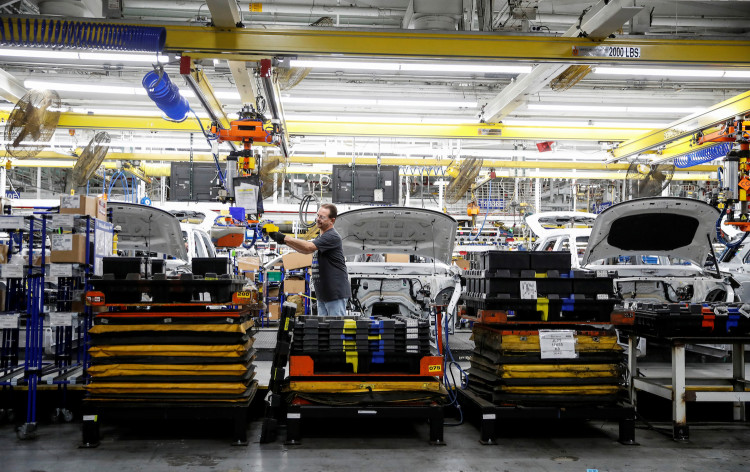This week, the battery factory in Michigan, a joint venture between CATL (Contemporary Amperex Technology Co. Limited) and Ford, encountered setbacks.
On September 27, local time, chairs of three U.S. House committees requested Ford to submit documents related to its collaboration with Chinese battery company CATL. They also hinted at the possibility of summoning Ford CEO Jim Farley to testify before Congress.
The request came from Republican Representatives Jason Smith, Cathy McMorris Rodgers, and Mike Gallagher, who chair the House Ways and Means Committee, Energy and Commerce Committee, and China Select Committee, respectively. They sought documents detailing Ford's technology licensing agreement with CATL, as well as communications between Ford and the Biden administration concerning the licensing agreement and potential tax credits.
The representatives indicated that if Ford doesn't disclose the requested records by October 6, they might resort to other means to obtain the documents or insist on Farley's appearance before Congress to explain the non-compliance.
As of this article's publication, CATL had not provided a clear response to the news.
Earlier in February, Ford announced its collaboration with CATL to build a battery factory in Michigan with a total investment of $3.5 billion. While Ford owns the new factory, CATL provides construction and operational services and licenses its battery patent technology.
The factory is expected to start operations in 2026, with an annual battery production capacity of 35GWh, sufficient for 400,000 electric vehicles.
This isn't the first time Representatives Smith and Gallagher have raised concerns about CATL's collaboration with Ford. On July 21, both sent a letter to Farley, similar in content to the recent one, requesting copies of Ford's licensing agreement with CATL and related communications, as well as communications between Ford and the Biden administration about tax credits.
They expressed concerns that the collaboration might channel U.S. tax credits for electric vehicle purchases to China and make Ford reliant on Chinese technology.
According to the Inflation Reduction Act implemented by the Biden administration in April, U.S. consumers won't receive a $7,500 tax credit for purchasing an electric vehicle if its battery components are manufactured or assembled by "entities of concern."
A Ford spokesperson stated that the company had responded to several congressional letters, thoroughly addressing concerns and sharing details about Ford's efforts to strengthen domestic battery manufacturing.
Ford has repeatedly emphasized the benefits of operating a battery factory domestically for customers, the company, and the nation. However, on September 25, Ford announced a pause in the construction of the Michigan battery plant, citing concerns about its competitive operation due to ongoing wage contract negotiations. CATL responded by stating that the joint project with Ford is progressing as planned.
Navigating the Challenging U.S. EV Market: To Enter or Not?
Previously, when Ford's collaboration with CATL faced criticism from U.S. politicians, Chinese Foreign Ministry spokesperson Wang Wenbin publicly stated that normal trade cooperation between Chinese and U.S. companies should not be politicized. He urged certain individuals in the U.S. to stop unfairly targeting foreign companies.
Currently, CATL is the world's largest producer of power batteries. According to statistics from South Korean consulting firm SNE Research, from January to July this year, CATL ranked first globally with a 36.6% market share. For six consecutive years, it has topped the global power battery installation list.
In terms of recent shipment data, in the first half of this year, global power battery shipments amounted to 431.8GWh, with total sales of $70.5 billion. CATL shipped 141GWh, accounting for 32.7% of the market, with sales of $20.1 billion, a 28.5% share. Both figures lead globally.
CATL previously stated that its collaboration with Ford would offer the most competitive products to the market. This technological collaboration model represents a strong synergy between CATL and Ford.
For battery companies, the U.S. electric vehicle market remains a promising frontier. According to Cox Automotive's latest statistics, in the second quarter of 2023, a record 295,255 electric vehicles were sold in the U.S. market, a roughly 14% increase from the first quarter. This growth is attributed to more affordable prices, new government tax incentives, and an expanding range of electric vehicle models. Overall, Tesla, Rivian, and Lucid all achieved impressive results.
In the U.S. electric vehicle market, South Korean battery companies LG Energy Solution, SK Innovation, and Samsung SDI remain the primary battery suppliers. These companies have entered the U.S. power battery supply chain through joint ventures or wholly-owned subsidiaries and have established partnerships with several U.S. automakers.
Interestingly, on the same day Ford announced the pause in the construction of its Michigan battery plant, South Korea's Samsung SDI revealed plans to expand its existing battery factory in the Detroit suburbs of Michigan. The expansion will add approximately 218,000 square feet and will cost $41 million, creating 368 new jobs.
Despite challenges, Chinese battery companies remain keen on establishing production capacities in the U.S. Recently, two major Chinese companies, Guoxuan High-tech and EVE Energy, announced plans to build factories in the U.S. In September, both companies released announcements: the former will invest $2 billion through its wholly-owned U.S. subsidiary to build a battery pack factory in Illinois, expected to start production next year, while the latter will jointly invest $2.64 billion with three partners to establish a joint venture in the U.S. to build battery capacity. EVE Energy plans to invest no more than $150 million in cash, holding a 10% stake in the joint venture





